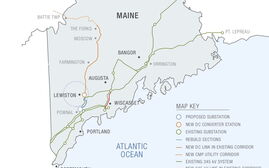Mills praised and panned for vetoes of two anti-CMP transmission bills
 Photo / Jeff Kirlin
Gov. Janet Mills, shown in this file photo from earlier this year, vetoed on Wednesday two bills that would have created extra hurdles for Central Maine Power's controversial $1 billion, 145-mile transmission project through western Maine.
Photo / Jeff Kirlin
Gov. Janet Mills, shown in this file photo from earlier this year, vetoed on Wednesday two bills that would have created extra hurdles for Central Maine Power's controversial $1 billion, 145-mile transmission project through western Maine.
Gov. Janet Mills vetoed on Wednesday two bills that would create additional hurdles for Central Maine Power’s $1 billion New England Clean Energy Connect transmission project through western Maine.
Mills said LD 1363 and LD 1383 were “poor public policy,” in part because they would give local governments the ability to block the project, which aims to bring Canadian hydropower to the New England power grid via a new 145-mile transmission line.
CMP’s NECEC project to deliver 1,200 megawatts of renewable energy generated by Hydro-Quebec to Massachusetts received a critical “certificate of public convenience and necessity” from the Maine Public Utilities Commission on April 11, but still needs regulatory approvals from Maine Department of Environmental Protection, Land Use Planning Commission, the U.S. Army Corps of Engineers and Massachusetts regulators.
Mills’ vetoes were praised by supporters of the controversial CMP project and criticized by the project's opponents.
Benjamin Dudley, director of Mainers for Clean Energy Jobs, issued this statement in support of Mills:
“We applaud Gov. Mills’s vetoes of these bills that would undermine Maine’s ability to take a leading role in significantly reducing greenhouse gas emissions and harm opportunities for Maine’s workforce.
“These bills attempted to alter well-functioning state laws specifically to undermine a single project: the New England Clean Energy Connect. The proponents of these bills readily conceded this in their public hearing testimony.
“Past legislatures wisely established balanced criteria for safeguarding the public’s environmental and economic interests in development projects exactly like this. They also delegated powers to state agencies so that the unbiased review of the facts would be protected from undue political pressure. Governor Mills’s actions protect this system of impartiality, one that continues to serve Mainers well.”
Richard Barringer, a member of the Maine Clean Energy Jobs coalition and former commissioner of the Maine Department of Conservation, issued this statement, also in support of Mills’ vetoes:
“Maine must do its part to reduce the greenhouse gas emissions that are the source of climate change. Gov. Mills recognizes that the New England Clean Energy Connect is a common-sense step in the right direction.
“Maine is already experiencing the negative impacts of climate change. Rising temperatures are having public health impacts like increases in heat stress and in the spread of Lyme disease. Changes to precipitation patterns threaten agricultural and winter sports industries. Ocean warming and acidification threaten our fisheries and marine ecosystems. Sea-level rise is expanding flood zones, eroding beaches and threatens the future of coastal communities. Two-thirds of all Maine wildlife and plant species are vulnerable to the effects of climate change.
“If we’re going to be serious about stemming the tide of these alarming impacts by eliminating greenhouse gas emissions from our regional energy systems, we have to accept the reasonable tradeoffs – not to mention the considerable economic benefits! – presented by projects like the New England Clean Energy Connect.”
Mainers for Clean Energy Jobs is a coalition of Maine individuals, businesses and associations who support the New England Clean Energy Connect.
Statement from opposition group
Sandi Howard, director of Say NO to NECEC, issued this statement Wednesday afternoon:
"On behalf of the majority of Mainers and the 5,400-plus Say NO to NECEC grassroots effort, I am extremely disappointed to report that Gov. Mills just vetoed two local control bills LD 1363 and LD 1383 that would give landowners and local municipalities the opportunity to weigh in on permitting decisions for the CMP corridor."
"As town, county, and state representatives learned more about the CMP corridor, they realized what a bad deal it is for Maine and rescinded support. Unfortunately, Gov. Mills sided with foreign corporations that will make a huge profit instead of Mainers who are truly concerned about Maine's environment, wildlife habitat, scenic character, and economic impacts to biomass, logging, and tourism industries."
"These bills provided an opportune moment for Gov. Mills to reflect on the will of Maine people and use this moment as her exit strategy from supporting the corridor. We are deeply disappointed that the governor has been influenced by foreign for-profit corporations who do not have Maine in their best interests. It's clear that she is dismissing the widespread citizen opposition to the CMP corridor."
Howard said in a news release that to date no town in the corridor in upper Somerset support the project, and most of Franklin county along the corridor oppose CMP’s transmission project, adding that 14 towns along the corridor voted to rescind support or oppose the project in addition to Franklin County commissioners rescinding support.
"It's clear that citizen's want to have a voice on the largest elective transmission project and for-profit project as evidenced by the scores of towns rescinding support or opposed and the five additional towns that will vote on the issue in the coming weeks,” she said.
Howard called on Maine representatives and senators in the 129th Legislature “to truly be the voice of the people in Augusta and vote to override these vetoes with the necessary two-thirds majority votes.”














0 Comments